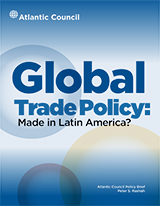The policy brief lays out nine recommendations that policymakers can take to ensure that the Trans-Pacific Partnership (TPP) and the Transatlantic Trade and Investment Partnership (TTIP) contribute to a broader level of international economic cooperation and sustainable growth. It is the first publication of the Atlantic Council’s new Global Trade and the Americas initiative, which engages and informs influential European, US, and Latin American public sector, business, civil society, and media leaders on the role of Latin America in international commerce.
Authored by Peter Rashish, an Atlantic Council author and consultant and senior trade adviser at Transnational Strategy Group LLC, “Global Trade Policy: Made in Latin America?” argues that “Latin America is at a crossroads as the two mega-regionals take over (at least temporarily) from the WTO as the main locus of trade policy innovation.”
Among the nine recommendations, the policy brief calls for the following:
- The United States and the European Union should explore making mutual recognition agreements in TTIP open to Latin American countries who can comply with either the US or the EU standard;
- If the United States and the EU decide to allow other countries to dock onto TTIP once concluded, they should include their largest Americas FTA partners—Canada and the four Pacific Alliance countries—among the priority candidates; and
- Once TTIP is concluded, the United States, EU, Canada, and the four Pacific Alliance countries will all have FTAs with each other and should consider adopting common approaches to rules of origin in order to facilitate trade.
“Last week’s alignment of the TPP ministerial meeting in Singapore and the TTTIP negotiations outside Washington reinforce the potential for global trade momentum. This policy brief shows how it’s a missed opportunity to overlook how Latin America is in many ways at the center of these mega-regionals’ convergence,” said Adrienne Arsht Latin America Center Deputy Director Jason Marczak.
“We’re at a pivotal moment for global trade. The United States Europe, and Asia are major focal points for these ongoing negotiations, but TTIP on its own will not be sufficient. We must look for ways to build on this critical opportunity by reaching out to Latin America and other emerging markets.,” underlined Fran Burwell, vice president and acting director of the Global Business and Economics Program.
